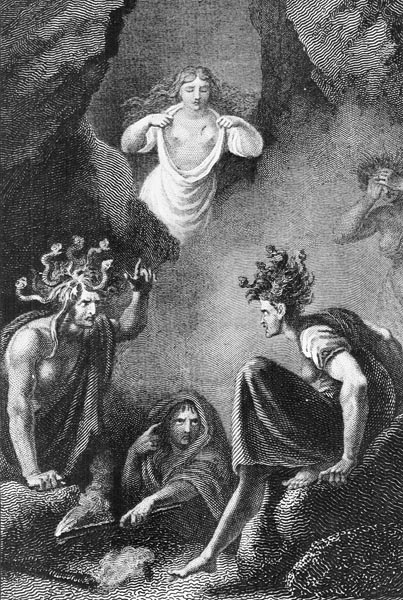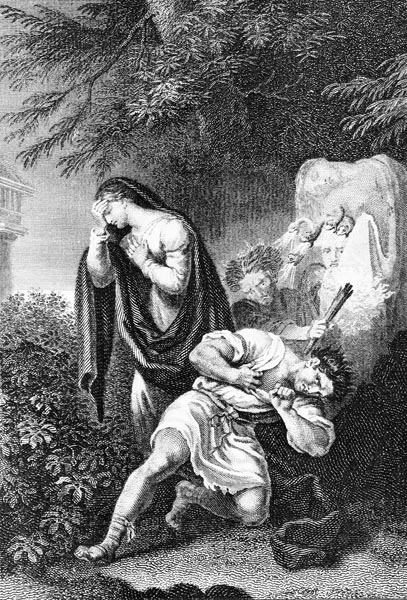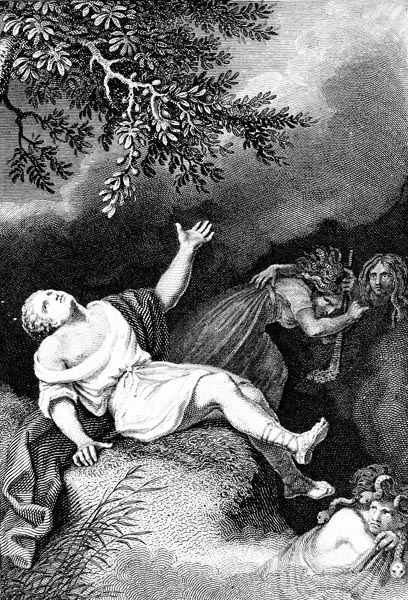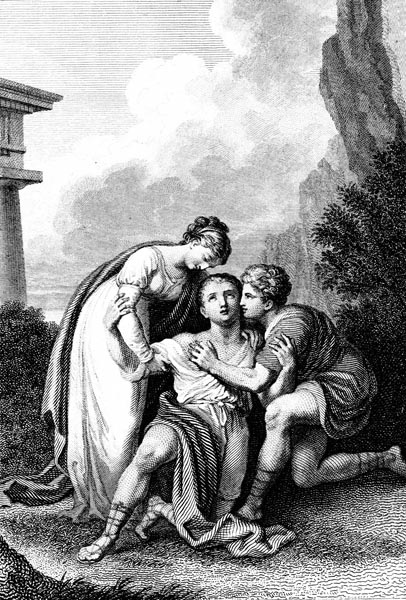Johann Wolfgang von Goethe
Iphigenia In Tauris (Iphigenie auf Tauris)
Act III
Translated by A. S. Kline © Copyright 2023 All Rights Reserved
This work may be freely reproduced, stored and transmitted, electronically or otherwise, for any non-commercial purpose. Conditions and Exceptions apply.
Contents
Act III: Scene I
(Iphigenia, Orestes)
Iphigenia Man of ill-fortune, I unloose your bonds,
Only to send you to a painful fate.
The freedom granted by this sanctuary
Is, like the last flicker of life that lights
Some dying face, a harbinger of death.
And yet I cannot, dare not, tell myself
That you are lost! How could I slay you,
Condemn you to death with murderous hand?
And none whosoever can take your life
As long as I am still Diana’s priestess.
Yet if I refuse to perform that office,
As the king, in his anger, will demand,
He’ll choose another maiden in my stead
To succeed me, and naught will you have
But my heartfelt sympathy to sustain you.
O, my dear countryman! The humblest slave
That has stood before the gods of our hearth
Would be most welcome in this foreign land;
How can I grant blessing and joy enough,
To one who recalls the image of the heroes
Whom my dear parents taught me to honour;
One who stirs, in the depths of my heart,
A fresh, and most welcome, glow of hope!
Orestes Is it your prudent intent, then, to hide
Your name and origin? Or may I know,
Who, like a divine being, greets me thus?
Iphigenia You shall learn of both. But come, tell me,
What I was only half-told by your brother:
The fate of those who sought return from Troy,
And met a harsh and unexpected end,
Unseen, at the threshold of their homeland.
It is true that I was young when brought here.
Yet still I recall the shy glance of wonder
And fear, with which I viewed those heroes,
As if Olympus had opened, and had sent
Mighty forms born of the ancient world
To strike terror, below, in Trojan hearts.
Agamemnon was glorious, above all!
O tell me, is it true then that he died,
Though he had reached his home, at the hands
Of Aegisthus, through Clytemnestra’s wiles?
Orestes It is.
Iphigenia Woe to you, accursed Mycenae!
Tantalus’ scions, thus, with murderous hands,
Like savages, have sown there, curse on curse,
And like the shaken heads of the wild weeds
Have scattered a thousand seeds all about,
And spawned an endless line of murderers,
Committed to everlasting vengeance!
Now tell whatever of your brother’s tale
Its dark and dreadful horror veiled from me.
Did then the last descendant of that tribe,
The noble child, destined to be, perhaps,
The avenger of his father, did Orestes,
Escape the blood? Or did a like cunning,
Entwine Avernus’ net about the youth?
Is he amongst the living? And Electra?
Orestes Both are yet alive.
Iphigenia O, lend me, golden Sun,
Your brightest rays, and shed them richly now,
Before Zeus’ throne! For I am poor in thanks.
Orestes Are you connected to that royal House?
Are you bound to it by the closest ties,
As your unbounded joy would seem to show?
Then tame your heart, and so restrain it!
For the pain must ever be unbearable,
Of a sudden fall from happiness to woe.
You only know of Agamemnon’s fate.
Iphigenia Was that not all the news you have to give?
Orestes You have but heard the half of its horror.
Iphigenia What is there to fear? Those two both live.
Orestes Have you no fear then for Clytemnestra?
Iphigenia Her, no fear of mine, nor hope can save.
Orestes She has departed from the land of hope.
Iphigenia Did she shed her own blood in repentance?
Orestes No, and yet her own blood wrought her death.
Iphigenia Speak openly; dispel all speculation.
Uncertainty’s dark wings about my head
Strike, a thousand times, at my anxious brow.
Orestes Have the gods, on high, chosen me to be
The herald of a deed I’d rather hide
And in the dark and silent realm of night
Conceal forever? Much against my will,
Your gentle request now compels me.
It alone can make me tell that tale of woe.
On the day of her father’s death, Electra
Hid Orestes, and so saved her brother.
Strophius, his father’s brother-in-law,
Gladly raised him with his son, Pylades,
Who quickly bound the bonds of friendship
About the newcomer, and as they grew
A burning desire rose within their hearts,
To seek vengeance for the death of the king.
Disguised and unnoticed they appeared
In Mycenae, feigning to bear the news
Of Orestes’ death and, indeed, his ashes!
Clytemnestra seemed to welcome them.
Orestes soon made contact with Electra,
Who roused the fire of vengeance to flame.
Which in the sacred presence of his mother
Had seemed to fail. Silently, she led him
To the place where their father had been slain,
And where a lasting trace of his spilt blood,
As yet still discoloured the paving stones,
Hinting, despite their cleansing, at revenge.
With fiery eloquence, she then described
Every circumstance of the evil deed;
Her own wretched and oppressive life;
The successful traitor’s blatant insolence;
And the danger now threatening their line,
From one who was like to a stepmother.
Into his hand she gave the ancient blade
So often wielded in Tantalus’ House,
And, at her son’s hand, Clytemnestra died.
Iphigenia Immortal one, you who spend your pure days,
Happy, and blessed, amidst clouds ever-new,
Have you, then, kept me here, these many years,
Parted from my people, yet close to you,
Involved in this mere childish occupation,
Nurturing your flames, as you intended,
So that my spirit might be drawn above,
As is your sacred flame, forever bright,
Only to feel, this deeper pain, on hearing
Of the vile abominations of my House?
Speak on, of my poor, wretched Orestes!
Orestes Oh, if I could but tell you of his death!
As if fermenting from the victim’s blood,
The mother’s shade arose, and cried aloud
To Night’s ancient daughters, the dread Furies:
‘Let not his mother’s murderer escape!
Pursue the criminal, who now is yours!’
They heard her, and gazed from cavernous eyes,
With an eagle-like intent, on all around.

‘They heard her, and gazed from cavernous eyes’
They stirred, then, from their pit of darkness,
And from its corners crept their companions,
Remorse and Dread, while there, before them,
Rose up a mist from Acheron’s dark stream,
That veiled the murderer’s brow, recalling,

‘…from its corners crept their companions, Remorse and Dread’
The inerasable account of what was done
To one now doomed to endless perdition,
Polluting the earth, the gods made fruitful,
From which the ancient curse banished them.
So, their swift feet pursue the fugitive.
And, if they pause, it troubles him the more.
Iphigenia Unhappy man, your fate resembles his!
You feel as he, poor fugitive, must feel.
Orestes What’s this, you say? Think you his fate is mine?
Iphigenia A brother’s murder weighs as heavily
On you; your younger brother told the tale.
Orestes It would be wrong of me to thus allow
Lying words to deceive your noble spirit.
A stranger, full of caution and cunning,
May well deceive another with his lies,
But let there be only truth between us!
I – am Orestes! And this guilty head
Sinks downwards, to the tomb, and longs for death,
And, in whatever form, would give it welcome!
Whoever you may be, I wish deliverance
For you and for my friend, I need it not.
It seems you linger here against your will.
Leave me, and find some manner of escape.
My lifeless body hurled from the headland,
Let my blood mingle with the seething waves,
And bring a curse upon this barbarous shore.
May you two, as friends, return to Greece,
And start a fresh life there, in that fair land.
(He moves away)
Iphigenia At last, you grant my request, Fulfilment,
Fairest daughter of mighty Zeus on high!
How vast your noble form! My eyes, straining,
Can barely see your hands, which are filled
With things of dread, or garlands that bless,
Which are, the latter, treasures of Olympus.
As we know a king for the fine excess
Of gifts he can muster, though naught to him
Riches to thousands, so you, the gods above,
Are known for your gifts, wisely withheld
Though long-prepared, because you alone
Are aware of those things of use to us.
You view the wide realm of the future,
While some mist or other veils from us
The starry evening sky. Calmly, you hear
Our every childish plea for greater haste,
Nor offer heaven’s golden fruit too soon;
And woe to those defiantly impatient,
Who enjoy but sour fruit before they die.
Let not this scarcely dreamed of happiness,
So long awaited, glide vainly by me,
Like to the shade of some departed friend,
Three times more painful in its vanishing!
(Orestes draws near once more)
Orestes Pray to the gods for yourself and Pylades;
But forego joining your own name to mine.
You will not save the guilty man, I say,
By sharing his accursed misery.
Iphigenia And yet my destiny is linked to yours.
Orestes No! Let me go alone, unaccompanied
To death. Were you to cover the guilty
With your veil, you would yet fail to hide him
From the fierce gaze of the Eternal Ones,
And even your sacred presence would serve
But to deflect them, not drive them away.
They with impious feet, dare not tread boldly,
Over the sacred ground within this grove,
Yet in the distance, on every side, I hear
Their hideous laughter. As, beneath the tree
That some traveller climbs to save himself,
The wolves yet lie in wait, likewise, out there,
Were I to leave this grove, the three would rise,
Shaking their serpent locks, to hunt their prey,
Raising great clouds of dust about his head.
Iphigenia Orestes, will you hear a friendly word?
Orestes Save it for him that’s favoured by the gods.
Iphigenia They offer the light of new hope to you.
Orestes Through mist and smoke, I see the murky glow
Of that dire stream that lights the way to Hell.
Iphigenia Have you but the one sister, Electra?
Orestes I had another. A kind fate, that yet
Seemed terrible to us, saved the eldest
From the misery that pursues our House.
Cease to ask; league yourself not with them,
The Furies, the Erinyes, that take delight
In rousing the living ashes of my soul,
Lest the last embers of the dreadful fire
That torched and ruined my ancient House,
Should fail to smoulder, here within me.
So, shall the flames, deliberately fed
With hellish sulphur, never cease to scorch
And torment the very depths of my soul.
Iphigenia I bring sweet incense that will calm those flames.
Oh, let the pure breath of love, its gentle breeze,
Cool the dark fire that burns within your breast.
Can you not hear, Orestes, my dear one?
Have the dread band of Furies that hound you,
Dried up the very life-blood in your veins?
Has some enchantment turned your limbs to stone,
Like to the gaze of the Gorgon’s severed head?
If a hollow voice, born of a mother’s blood,
Can summon you, in its dark tones, to Hell,
Shall not a pure sister’s words of blessing
Bring all the gods of Olympus to your aid?
Orestes She cries! She calls! Do you wish my ruin?
Does some vengeful goddess live within you?
Who are you whose voice so disturbs me,
A voice that penetrates my inner depths?
Iphigenia Your heart’s depths, indeed, reveal the answer.
It is I, Iphigenia, Orestes!
I yet live.
Orestes You!
Iphigenia My brother!
Orestes Avoid me!
Touch not these locks of mine, I caution you.
From them an inextinguishable fire,
Flames forth as from Creusa’s bridal dress!
Away! An ignoble death, it is, I’ll die,
Burning within myself, like Hercules.
Iphigenia You shall not perish so! Oh, if only I
Might hear a single tranquil word from you!
Dispel my doubts! Oh, let me be certain
At last of long-awaited happiness.
A wheel of joy and sorrow, endlessly,
Turns, and turns again, within my soul.
I recoil from the stranger with a shudder,
But my heart yet draws me to my brother.
Orestes Is this some temple of Dionysus?
Does a sacred madness grip its priestess?
Iphigenia Oh, hear me! Oh, but see how my poor heart,
After so long a time, finds bliss again;
And you, the dearest thing in all the world,
Suffer me to kiss your brow, and to enfold
You in these arms, that met but empty air
When they stretched out to clasp you so before!
Let me but do so! Joy bursts from my heart
More brightly than that spring, on Parnassus,
Flows, from cliff to cliff, to the golden vale,
And like to some blissful sea surrounds me.
Orestes! Orestes! Oh, my brother!
Orestes Lovely nymph, I trust not your words, nor you!
Diana commands far harsher servants.
And would avenge her shrine’s desecration.
Take your hand from my chest, and if some youth
You would seek to save, and love tenderly,
To whom you’d sweetly offer happiness,
Turn your thoughts to my far worthier friend.
He wanders there, along that stony path.
Seek him, guide him, pay no heed to me.
Iphigenia Brother, control yourself, and recognise
The sister you once lost; do not ascribe
To some wild and sinful surge of desire,
The pure and heavenly joy that she feels.
Goddess, remove the madness from his gaze,
So that this moment, born of supreme joy,
Is not rendered three times more wretched yet!
She’s here, your long-lost sister. Diana,
Saved her from the sacrificial altar,
And placed her here, in her sanctuary.
A captive, and doomed likewise to be slain,
You find here, in the priestess, a sister.
Orestes Wretched are we! Now may the sun behold
The final horror of our accursed House!
Is not Electra here, that we might perish
All three together, and her life not lead
To yet more woe, and greater suffering?
Come priestess, I will follow: to the altar,
Since fratricide is an accustomed rite
In our ancient House. I thank the gods,
That, childless, I go to my destruction,
As they intended. And you, take counsel
Not to hold the sun and stars too dear.
Come follow me, down to the gloomy realm!
As dragons, spawned in the sulphurous pit,
In savage war devour their kindred brood.
So does our maddened race destroy itself.
Childless and innocent, descend with me!
Do you gaze in pity! Cease to do so.
With such a gaze, did Clytemnestra seek
To find a way to move her son’s fierce heart,
And yet his upraised blade still pierced her breast.
The mother fell. Appear, unwilling spirit!
Stand within the circle you dire Furies,
And so, attend the welcome spectacle
The last and greatest horror you prepare!
Neither hatred nor vengeance whet the blade.
A loving sister is constrained to act.
Weep not! For yours is not the fault, indeed
Since my earliest years I have not loved
Any that I might love as I could you.
Yes, raise the knife, and spare not this breast,
Tearing it apart, that you might open,
A pathway for the seething blood within.
(He sinks down, exhausted)
Iphigenia I cannot bear this joy and misery
Alone. Where are you Pylades, dear friend?
Where are you now, for now I need your aid?
(She goes to look for him)
Act III: Scene II
(Orestes, waking from his stupor, and rising)

‘Grant me from Lethe’s stream One last refreshing draught’
Again! Again! Grant me from Lethe’s stream
One last refreshing draught of forgetfulness.
The pain of life will soon be washed away.
Upon its course, my spirit will flow quietly,
Surrendering to oblivion’s passage,
To you, you Shades. In your eternal mist.
A weary son of earth may cleanse his soul
Lapped tranquilly in such peaceful waters!
What murmurs are these among the branches;
What whispers resound within the twilight?
They gather now to welcome their new guest!
What noble company is this, now met,
This princely House rejoicing together?
They gather, peacefully, both young and old,
Women and men, clothed in godlike forms.
Yes, they are the ancestors of my House!
Atreus converses quietly with Thyestes
Whose sons sport playfully around them.
Is there no enmity between you now?
Vengeance dying with the light of the sun?
So am I welcome too, and fit to join
All of you, in your solemn procession.
Greetings fair ancestors! Orestes greets you,
The last male heir of your ancient tribe.
What you sowed, he has reaped and, laden
With curses, has descended among you.
Yet every burden here is easier to bear.
Accept him, receive him to your circle!
I honour you, Atreus, you, Thyestes,
And here we are all free of enmity.
Show me the father I saw but the once
While still alive! My father, is that you?
And is that my mother at your side?
Dares Clytemnestra now to take your hand?
Why then, Orestes too may approach her,
And thus declare to her: ‘Behold, your son!
Come all, behold your son! Bid him greeting.
Murder was the watchword of our House,
On earth above, and the race of Tantalus
Delights to hear it yet, beyond the grave.
You cry: ‘Welcome!’ and, indeed, receive me.
Oh, lead me to that honoured ancestor!
Where is the old man, that I may greet him,
That dear, much-venerated head, that met
In council with the gods of Olympus?
You seem to hesitate, and turn away.
What’s this? Do even the godlike suffer?
Alas it seems the powers above have bound
That hero’s chest with strong iron chains,
And so subject him, even here, to torment!
Act III: Scene III
(Orestes, Iphigenia, Pylades)
Orestes Have you descended to this place, already?
Welcome, sister! Yet Electra’s missing.
May some beneficent god slay her now,
And swiftly, with a not ungentle arrow.
And you, my dear friend, I must pity you.
Come, come with me, to the throne of Dis,
So, as his new guests, we may greet our host.
Iphigenia You siblings there, in the heavens above,
That shed your fair light, by night and day,
Upon all folk, yet not the dear departed,
Bring salvation to us, siblings, below!
Artemis, you love your brother dearly,
Beyond what heaven and earth may offer,
And turn your virgin face towards him,
Longing, ever, for his eternal light.
Let not my brother, one so lately found,
Be left to rage in blind insanity!
And as your will, intent on saving me,
Was once accomplished, now extend to me
And so, through me to him, your blessed aid,
Liberate him from the bonds of that curse,
Before the time to free him passes by.
Pylades Orestes, do you not know us, and this grove,
And this light, that never shines for the dead?
Do you not feel a friend’s, a sister’s arm,
That clasp you tightly, and as yet still living?
Grip them tight: we are no empty shadows.
Hear my words, gather yourself together!
Every moment is precious, and our return,
To our own homeland, hangs now by a thread,
Which seems as if spun by a friendly Fate.
(Orestes addresses Iphigenia)
Orestes Now, for the first time, with a heart set free,
Let me embrace you, sister, in pure joy!
You gods that, with your lightning’s power,
Tear apart the heavy clouds, and grant us
Sternly, mercifully, long-awaited rain,
With thunderous voice amid the roaring gale,
Drenching the earth in wild foaming torrents,
Yet soon dissolve our dread presentiments,
We who, doubly-blessed, find our amazement
Transformed to shouts of joy and thankful gaze,
The sunlight a thousand times reflected
In the fresh droplets on the grateful leaves,
While friendly Iris, with a light hand, parts
The grey veil of the last receding clouds;
O let me, here, enjoy, in thankfulness,
The bliss you grant me, while embraced once more
By my friend’s arms, and now my dear sister’s.
The curse is lifted; my heart tells me so.

‘The curse is lifted; my heart tells me so’
The Eumenides depart, and now I hear
The gates of Tartarus close upon them,
The thunderous bronze echoing, far away.
The earth gives off a refreshing odour,
And invites me to seek, within its bounds,
The joy of life and mighty deeds, once more.
Pylades Fail not to seize the hour, that rushes by!
The breeze that first fills our sails shall bear
The fullness of our joy to high Olympus.
Swift counsel, and resolve, are needed here.
The End of Act III of Goethe’s ‘Iphigenia in Tauris’